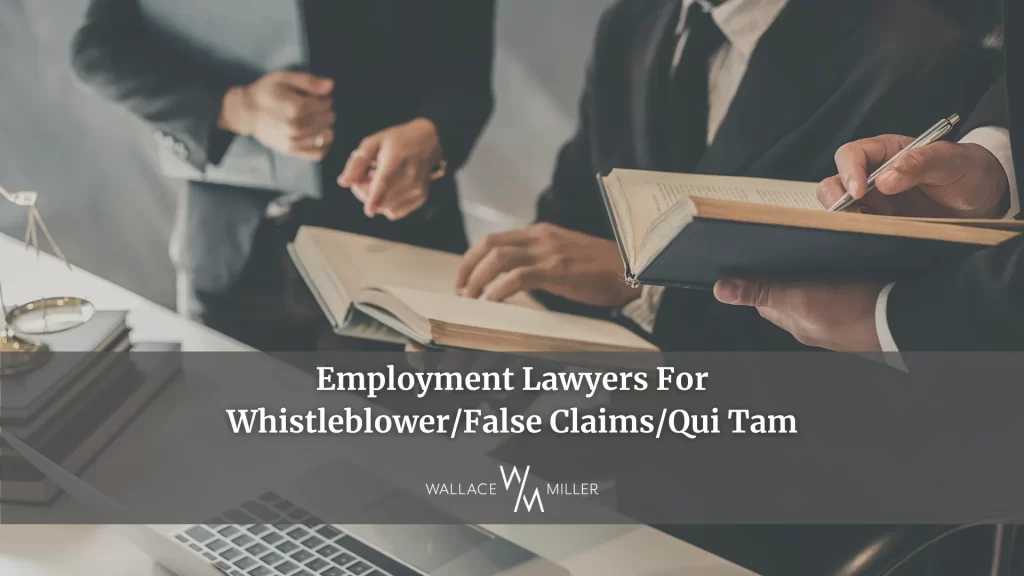
If you witnessed someone engage in illegal activity or fraudulent conduct against the government, do not hesitate to contact the class actions and commercial litigation attorneys of Wallace Miller. We could represent you in your claim and help you pursue legal action.
Reporting fraud is scary. You might worry about how it will affect your employment and whether your employer will retaliate. Various laws protect people who pursue qui tam lawsuits. You should not face any consequences for doing the right thing. You have a right to bring the illegal activity to light without risking your job and future.
At Wallace Miller, we believe in representing people like you who report the wrongdoing of others. Pursuing a qui tam claim might entitle you to a financial award. We will protect you during the legal process and provide the guidance you need. You won’t have to face your employer or another fraudulent party alone. You can count on us to remain by your side until the end.
Call Wallace Miller at (312) 261-6193 for your free consultation with one of our whistleblower and qui tam lawyers today.
Understanding a Qui Tam Lawsuit
You could file a qui tam lawsuit on the government’s behalf to expose a person’s fraudulent or abusive acts and receive a share of the recovered compensation. The government can bring a civil action against an individual or company upon discovering that they committed fraud against the government.
Typically, qui tam lawsuits apply to violations of the False Claims Act and other similar statutes. Qui tam can also apply to fraud claims involving local and state governments.
The False Claims Act is a federal law that prohibits any person or organization from filing false claims or making false records regarding a federal healthcare program funded by a state healthcare system or the United States government. Violating any part of the act could result in imprisonment and financial penalties.
The False Claims Act also includes whistleblower protections to protect employees who report violations of federal law. It protects against termination of employment, harassment, discrimination, and other forms of retaliation by the employer. It also allows a monetary award for reporting an employer’s illegal actions.
Filing a Qui Tam Whistleblower Claim
You can pursue a qui tam lawsuit on behalf of the government if you have evidence, information, or knowledge of dishonesty or fraud committed by a person or company involving specific types of governmental transactions. You should not file this type of claim on your own. Hiring a lawyer from Wallace Miller could be beneficial to the outcome of your case.
According to section 3729 of the False Claims Act, you can bring a claim against any individual who knowingly:
- Uses or makes false statements or records related to a fraudulent or false claim
- Conspires to commit fraud against the government with other people
- Makes a fraudulent or false claim to receive approval or payment
- Additional types of fraud against the government
When you file the lawsuit, it stays confidential initially. The defendant doesn’t get served with the complaint right away. Instead, the government takes time to investigate the claim and determine its validity. The government will also decide if they want to intervene and take on the responsibility of pursuing the claim.
You can continue to be a party to the legal action even if the government takes the lead on the case. If they don’t, you can pursue the lawsuit with the help of your lawyer. However, the government can choose to intervene at any point in the legal process.
To find someone guilty of defrauding the government, the court must be provided evidence that the alleged guilty party had actual knowledge of the activity. Actual knowledge means they knew of the fraud, had reckless disregard for the false information, or deliberate ignorance of the truth. However, intent is not necessarily a requirement. Having actual knowledge of fraud against the government could be enough to find the defendant guilty.
Pursuing a Claim as a Government Employee
Government employees can also be whistleblowers. The same laws apply and protect them from retaliation for disclosing the unlawful or unethical behavior of the government agency.
Common types of fraudulent activity by the government that qualify for a qui tam lawsuit include:
- Gross Waste of Funds
- Violations of Rules, Regulations, or Laws
- Substantial Danger to the Safety or Health of the Public
- Gross Mismanagement
- Abuse of Authority
Whether you found proof of fraud by the federal government or suffered retaliatory acts by your employer, you can pursue civil action for compensation as a federal employee.
Compensation for Whistleblowers

The U.S. Securities and Exchange Commission (SEC) has the authorization to provide whistleblowers with monetary awards if the legal action leads to sanctions. You should receive a percentage of the proceeds the government recovers for the fraud. The amount of compensation awarded to you will depend on the extent of your cooperation and participation in the case and the prosecution of the defendant.
If the government doesn’t handle the civil action and you decide to pursue the lawsuit yourself, you could recover a higher financial award. You will receive a higher percentage of the settlement or proceeds from civil penalties and compensation. You might also receive compensation for court costs and attorney’s fees.
Protection Against Retaliation by an Employer
Discovering a supervisor, business owner, or even another employee committed fraud and coming forward with the information could risk your job and livelihood. Some people choose not to report fraudulent activity because they fear their employer will retaliate by firing them.
Federal laws are supposed to protect employees from retaliation after they speak up about illegal and fraudulent activity. Just because these laws exist doesn’t necessarily mean your employer won’t retaliate against you. Besides pursuing a qui tam lawsuit, you can also file a civil action against your employer for their mistreatment after you reported the fraud.
Under the False Claims Act, an employee or contractor who gets harassed, demoted, terminated, suspended, discriminated against, or threatened for reporting the fraud could pursue a claim for compensation to cover these losses and expenses:
- Back Pay
- Interest on Back Pay
- Reasonable Attorney’s Fees
- Job Reinstatement with the Same Seniority Status
- Litigation Expenses
- Compensation for Special Costs
Statute of Limitations for Qui Tam Lawsuits
You must initiate civil action against the fraudulent individual or company within the timeframe established by the statute of limitations. This is the amount of time you’re allowed to file your lawsuit in court. According to section 3731 of the False Claims Act, you must file the lawsuit within:
- Six years from the date of the violation; or
- Three years from the date, the government official responsible for bringing legal action knew or should have reasonably known about the facts material to the right of action, whichever occurs later.
However, you are not allowed to file suit after ten years have passed since the individual or company committed the violation.
There is also a federal statute of limitations for whistleblower retaliation claims. If your employer retaliated against you for pursuing a qui tam lawsuit, you must pursue civil action against your employer within three years of the date of the retaliatory action.
At Wallace Miller, our team of dedicated lawyers is ready to fight for you. We will be your advocate and protect you during your qui tam lawsuit. You don’t have to pursue legal action against your employer by yourself. We will handle every legal aspect of the case on your behalf.
If you discovered that someone committed fraud against the government and want to bring a qui tam claim against them, call Wallace Miller for your free consultation at (312) 261-6193.

Contact Us
The unfortunate truth is that many employers knowingly engage in illegal acts without regard for the effects those acts have on those around them. Some employers force or threaten their employees to participate in the fraud. Anyone who fears losing their job or facing the consequences of saying no to their boss might choose to keep quiet about what’s happening. However, it’s vital to understand that you have options.

